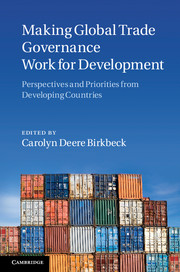 Making Global Trade Governance Work for Development
Making Global Trade Governance Work for Development Book contents
- Frontmatter
- Contents
- Figures
- Tables and boxes
- Contributors
- Acknowledgements
- Introduction
- Part I Global trade governance
- Part II Roles and responsibilities in global trade governance: diversity in developing country priorities and strategies
- Part III Strengthening multilateralism
- Part IV Making WTO negotiations and decision-making processes fairer
- Part V Conclusion
- Index
Introduction
making global trade governance work for development
Published online by Cambridge University Press: 07 September 2011
- Frontmatter
- Contents
- Figures
- Tables and boxes
- Contributors
- Acknowledgements
- Introduction
- Part I Global trade governance
- Part II Roles and responsibilities in global trade governance: diversity in developing country priorities and strategies
- Part III Strengthening multilateralism
- Part IV Making WTO negotiations and decision-making processes fairer
- Part V Conclusion
- Index
Summary
In a world where the vast majority of nations are developing countries and a significant proportion of their population lives in poverty, ensuring that international trade supports development is one of the greatest challenges for global governance.
Over the past decade, development issues have properly emerged as a central concern of international trade negotiations. Yet, considerable dissatisfaction remains with the degree to which development concerns, and broader issues of sustainable development, are addressed in practice. This dissatisfaction has two core dimensions.
- Type
- Chapter
- Information
- Making Global Trade Governance Work for DevelopmentPerspectives and Priorities from Developing Countries, pp. 1 - 22Publisher: Cambridge University PressPrint publication year: 2011
